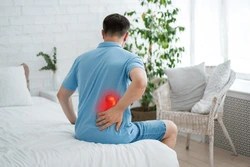Let’s face it. As a man, there are probably things you just do NOT want to talk about. Incontinence is probably one of those topics, but the truth is that if you are suffering with incontinence, you must deal with it. So continue reading and consider it the guy’s guide to male incontinence. Then your next step will be to talk to board-certified urologist Dr. Edward J. Sanchez about it!
What Might Be Causing It
Male incontinence is the involuntary or accidental leakage of urine, and it is most likely a symptom of another condition which causes loss of bladder control.
One of the first things you should know about incontinence is that you’re not alone. 11 to 34 % of older men can suffer from it, translating to about 5 million men.
Urge Incontinence
Involuntary contractions of your bladder muscles or what is known as an overactive bladder is a leading cause and is quite common in men. Sometimes it may only be a slight dribble, but with urge incontinence you have the urge to go, though you leak before you can make it to the bathroom.
This can be caused by an enlarged prostate gland, medications, certain fluids/foods, among other causes. What makes it worse is that you can be triggered by things such as running water, going into a cold room, or just getting up out of a chair.
Stress Incontinence

If you leak urine when you cough, sneeze, or lift a heavy object, you most likely have stress incontinence. This can result after some prostate surgeries, including treatments for cancer. Prostate removal (prostatectomy), for example, can weaken the nerves around the bladder and pelvic floor muscles. Complications of some surgeries for enlarged prostate can also weaken the closure mechanism of the bladder and pelvic floor. Radiation can also cause damage to muscles making them weaker.
Diabetes, smoking, and excess weight can also be part of the problem.
Additional Causes Of Male Incontinence
Spinal injuries or other neuromuscular diseases can also trigger male incontinence.Conditions such as parkinson’s disease, multiple sclerosis, strokes, or other injuries can lead to worsening of incontinence symptoms.
What Can You Do
There are some behavioral changes you can make to relieve some of the symptoms of male incontinence.
- Know what your beverage triggers are and avoid them. Avoid alcohol and caffeine in particular and especially if there isn’t a convenient bathroom available.
- Plan to urinate at regular intervals even if you don’t have the urge to go. Use the bathroom every 2 hours, for example.
- Lose some weight. You’ve been meaning to do that anyway, right? You are putting extra pressure on your bladder.
- Talk with Dr. Sanchez about Kegel exercises. They are not only for women.
- Stop smoking.
If the conservative options are not successful, there are a number of treatments, including surgical or procedural options that can be used to help your symptoms. Some common options include sacral neurostimulators such as Axonics for urge incontinence, slings for stress incontinence, or even implantable devices to replace a non functioning urethral sphincter. Now that you learned some critical information, it is time to take action.
Schedule a Male Incontinence Appointment in The Woodlands & Houston, TX
Contact board-certified urologist Dr. Edward J. Sanchez and discover how you can improve your symptoms of male incontinence. Call (281) 351-5174 to schedule an appointment at our urology clinics in The Woodlands and Houston, TX today.
Sources:
https://www.healthline.com/health/overactive-bladder/male-incontinence#treatment
http://www.ucurology.org/areas-of-specialization/male-incontinence





